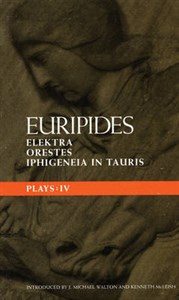
Euripides Plays: 'Elektra', 'Orestes' and 'Iphigeneia in Tauris'
Euripides Plays: 'Elektra', 'Orestes' and 'Iphigeneia in Tauris'
ISBN: 9780413716309
Out of stock
Trade Paperback
Methuen Print on Demand: Usually dispatched in 2-3 weeks
Overview
Euripides, the Athenian playwright who dared to question the whims of wanton gods, has always been the most intriguing of the Greek tragedians. Now, with translations aimed at the stage rather than the page, his restless intellect strikes the chord.This volume contains some of Euripides' most famous works: Elektra, which reverses previous notions of 'heroic' behaviour; Orestes, in which almost all the characters are driven by base motives of cowardice or revenge; Iphigeneia in Tauris who presumes her brother Orestes dead and her mother Klytemnestra and stepfather Aigisthos still living, is visited by a surprise guest. Elektra, Oresetes and Iphigeneia in Tauris were performed together as Agamemnon's children at The Gate Theatre in 1995 and show the consequences of Agamemnon's "sacrifice" of his daughter at the start of the Trojan war.
